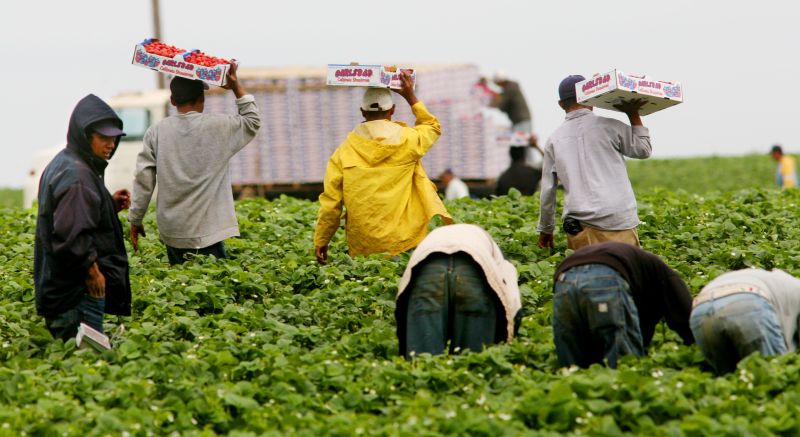Sandoval has about 100 workers on his payroll. When farmers need a crew to pick cherries or pumpkins or asparagus, they call him to send the workers. He needs to offer insurance this year, and he's smarting at the price tag. At $300 a month per employee, he's looking at a $30,000 monthly bill.
“Yeah, no. No, no, no,” Sandoval says about absorbing that into his budget. “The numbers aren't there. My margin is 10 percent. And I have to increase expenses 10 percent? Well, that doesn't work.”
So, like a lot of contractors, he’s passing the bill onto the farmers, who in turn are passing the bill onto the farmworkers. Under the Affordable Care Act, employees can be asked to contribute 9.5 percent of their income toward health premiums.
But for farmworkers who pick oranges or peaches for $10 an hour, that’s still too much.
Agostin Garcia says the two contractors he works for near Fresno offered him insurance directly. But when he saw the price tag, he turned them both down.
“For me, I’m the only one in my house who works. There’s five of us in the family,” he says in Spanish. “It just wouldn’t work. Either I pay for health insurance, or I pay the rent and utilities.”
Garcia says only a fraction of his co-workers have signed up for coverage. He says when farm labor contractors hand out packets explaining the coverage, the page where workers reject it is right on top.
“I think they do it intentionally,” Garcia says. “They comply with the laws, by saying, ‘I offered.’ But they know that nobody’s going to accept it, they know that nobody’s going to pay those amounts.”
The cost isn’t the only thing about Obamacare stressing people out in the ag industry. Some are worried about immigration problems. Employers have to file new health care forms with the IRS for all their workers, whether they accept the insurance or not.
Kaya Bromley, an attorney who advises employers in the farming industry about the Affordable Care Act, says the health law will make it harder for contractors to turn a blind eye when workers give them fraudulent documents.
“Now that there’s more transparency because of all of the reporting, I think we're going to have a lot more data on how many illegal or undocumented workers we have,” she says.
Among the contractors she consults for, Bromley has seen a range of quasi-legal and even illegal strategies to sidestep the health law.
“I have heard of employees who are choosing to opt out because they want to fly under the radar. I have also heard of employers who are urging the opt-out or at least encouraging it,” she says. “And I warn all of them that they are going to be in big trouble.”
But it’s still early. There’s been no enforcement yet. The feds haven’t made an example of anyone, Bromley says, and so employers are ignoring the fact that they could face penalties that run several thousand dollars per employee.
“It’s huge. And no one’s talking about the enormity of it,” she says. “When it plays out, and the penalties start getting assessed, that's when people will start having religion about it.”
Farm labor contractors say they’re stuck in a Catch-22. The Affordable Care Act doesn’t cover undocumented immigrants, but contractors will get fined if they don’t offer them coverage. Contractors aren’t supposed to hire undocumented workers, but the president and Congress can't agree on what to do about the massive number of immigrants living and working here illegally.
How are contractors supposed to comply with the new health care law when the feds are deadlocked over how to update the immigration system?
“Our government, all they do is talk about it. They don’t fix anything, they make everything worse,” says Golinda Vela Chavez, who helps run a labor contracting company in Salinas.
Her company started offering their employees insurance last year, at no cost to the workers, and she says, still, more than half of them turned down the coverage.
This year, the company has to start filing the paperwork with the IRS and she says it's been a nightmare.
“They don’t try to help you, they want to get you,” she says. “They implement all these things, because they want to get you!”
Ofelia Reyes just wants peace of mind. She’s has been harvesting nectarines and tying grapevines in fields near Fresno for 20 years. She recently had a breast cancer scare. None of the contractors she works for have offered her insurance.
